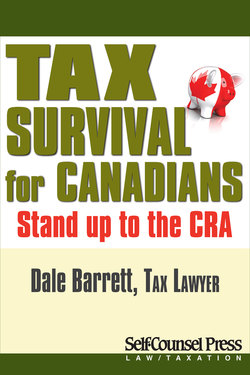Читать книгу Tax Survival for Canadians - Dale Barrett - Страница 4
На сайте Литреса книга снята с продажи.
1 INTRODUCING THE CANADA REVENUE AGENCY (CRA)
ОглавлениеSection 91(3) of the Constitution Act, 1867, provides the ability for the federal government to tax, and section 92(2) provides that ability for the provinces to tax. It was not until 1917 that the federal government started to apply an income tax, which was imposed to help finance World War I. At the time of the war, more than 90 percent of tax revenues were from indirect taxes; a number which has decreased sharply over the years. Today, income tax provides the greatest component of taxes collected by the government, and it has never disappeared from the Canadian landscape.
The Canada Revenue Agency (CRA) is a federal agency responsible for administering the tax laws of Canada such as the Income Tax Act and the Excise Tax Act, as well as the laws of many provinces and Aboriginal governments.
Formed pursuant to the Canada Revenue Agency Act, the CRA is the backbone of taxation in Canada, without which nobody would file returns or pay taxes and the entire country would grind to a halt. Our airports and borders would stop operating. Our soldiers wouldn’t be paid to protect our country, and the police wouldn’t be paid to patrol our cities. In short, the CRA is a necessity, and in order to achieve its mandate of administering the taxation system, it has been given very broad powers to get the job done.
Besides the administration of the domestic tax system, the CRA is the body that is involved with the administration of tax agreements between Canada and various other countries. It also administers various types of social benefits and incentive systems such as the Canada Pension Plan and Employment Insurance, and it oversees the registration of Canadian charities.
